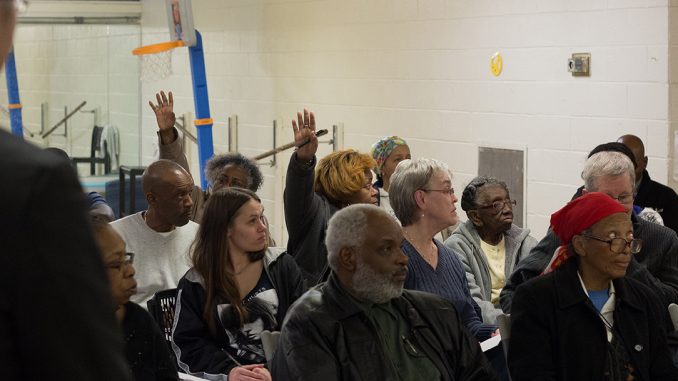
For the past five years, Namoi Miller has lived in what she calls a construction zone, not a neighborhood.
Miller has lived on Carlisle near Diamond streets for more than 30 years. The neighborhood used to be vibrant, with many families on her block.
“[Developers] want to demolish the house two doors from us,” Miller said. “The last five years we’ve had at least six or seven houses demolished and rebuilt [on our street]. I’m frustrated, it feels like the families are almost being forced out.”
Now, there are only five families left after students have overridden her block. And she’s worried it will continue with the building of the demolition and rebuilding of a home that will probably include more student housing.
These issues, along with several others concerning development west of Main Campus, were discussed at a 32nd Democratic Ward community meeting last night in Amos Recreation Center near 16th and Berks streets.
One of the four properties listed on the meeting’s agenda was voted on during the meeting. Votes by the ward, a registered community organization within the city, are nonbinding, but the city’s department of Licenses and Inspections takes the community’s opinion into account if it is concerned with zoning issues.
Around 25 community members attended the meeting to hear developers, some of which live within two houses away from the proposed developed properties. Community members had issues with every property discussed, with specific concerns being recent mistreatment of land by developers, parking and trash issues.
The one property that was voted on and passed was located at 1938 N. 19th St., which will have two four-person apartments. Photos of the abandoned, boarded-up building that currently stands there were passed around to attendees by the owner.
A property at 2031 Carlisle St. received pushback by community members. Community members learned that the refusal by L&I was that the property, which is currently a single-family home, is being requested to become a multi-unit home. Community members did not want to lose more single-family homes in the neighborhood.
They added they were concerned about demolition in the area.
“The issues that zoning board are considers are limited to land use issues,” attorney for 1608 Susquehanna Ave., 2031 Carlisle St. and 1938 N. 19th St. Zhen Jin said. “Not construction issues or demolition issues raised in the meeting.”
“Development is positive as a whole,” he added. “Are there growing pains during development? Absolutely.”

Because of the pushback, RCO Chair Judith Robinson pushed back voting on the property until the next meeting.The next meeting for the RCO is to be announced, Robinson said. This meeting will discuss student behavior and will vote on the three properties that did not receive votes.
Carl Klotzbach, a 2005 political science and history alumnus and developer on property 2031 Carlisle St., agreed to discuss creating a community benefit agreement. This would be an agreement that would give the community incentive to approve his property’s zoning.
“The community brought up some relevant and valid points,” Klotzbach said. “We’re open to working with the community. I would have questions if someone was building in my neighborhood. The hope going forward is to work to help the community understand what we’re looking to do so we can work better together and hopefully gain their trust and continue to build a partnership.”
The L&I hearing for property 1608 Susquehanna Ave. is set for April 12, and Robinson said there will be another 32nd Democratic Ward meeting before this hearing so she can write a recommendation to the L&I Zoning Board Adjustment.
A hearing for 2031 Carlisle St. will be on April 20 and the hearing for 2020 Carlisle St. will be held on April 28.
Senior architecture major and student from Building Relationships in Communities Andrew Mazer said during the meeting that at the next meeting where they discuss student behavior, he will attend and report it back to the workers in the Good Neighbor initiative.
BRIC is working with the Stadium Stompers to collect research on the building of the stadium.
“We’re trying to stay informed,” Mazer said. “We’re trying to get in front of the development issue that Temple has created for itself.”
“I thought the meeting was very productive and I commend these developers for sticking their neck out,” he added. “They clearly have a very tough audience for what their intentions are and I think they’re off to a good start.”
Gillian McGoldrick can be reached at gillian.mcgoldrick@temple.edu or on Twitter @gill_mcgoldrick.


Be the first to comment